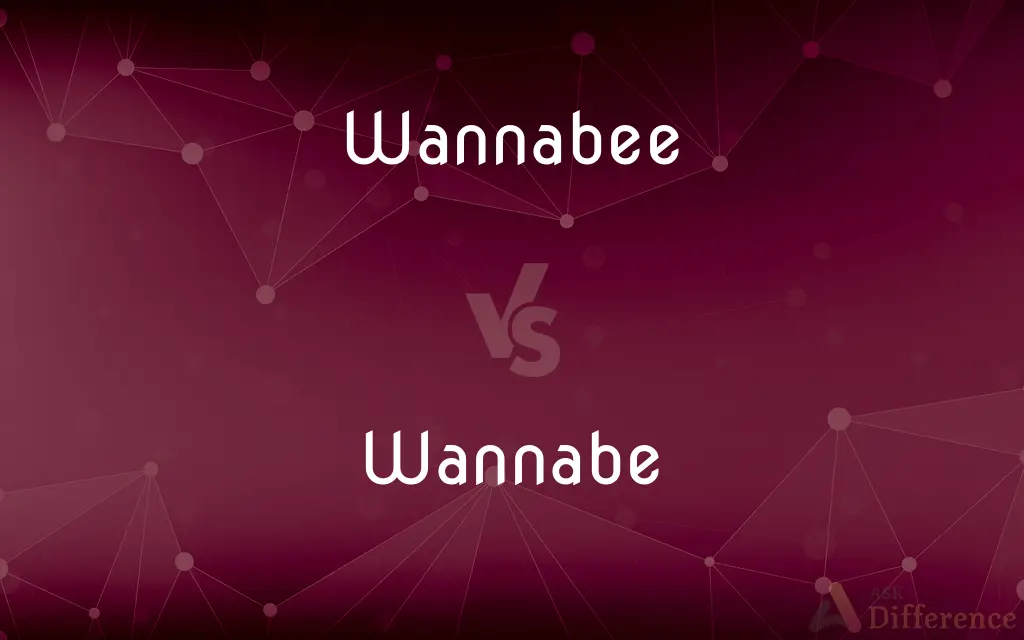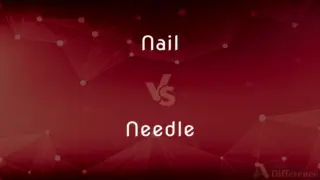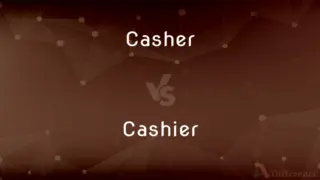Wannabee vs. Wannabe — What's the Difference?
By Urooj Arif & Maham Liaqat — Updated on April 8, 2024
Wannabee implies an imitation, focusing on the act of trying to be like someone else; Wannabe, although similar, is more commonly used and accepted in standard English.

Difference Between Wannabee and Wannabe
Table of Contents
ADVERTISEMENT
Key Differences
Wannabee is a less common spelling variant of wannabe, highlighting someone's attempt to mimic or aspire to be like another person or group. This term often carries a connotation of falling short in those attempts. Wannabe, on the other hand, is the widely accepted spelling in English, used to describe a person who desires to be or emulate someone else, especially in terms of career or lifestyle, but it can also imply a lack of authenticity or genuine talent.
Wannabee suggests a degree of imitation that is recognized and often criticized, pointing out the lack of originality or authenticity in the individual's efforts. Whereas wannabe is more neutral, used to denote someone's aspiration or desire without necessarily implying failure or inauthenticity.
Wannabee might be used in more derogatory contexts, emphasizing the negative aspects of emulation. Wannabe, while it can also be used derogatorily, is more commonly employed in everyday language to describe aspirations, sometimes even with a hint of empathy or humor.
In terms of linguistic acceptance, wannabee is seen as an alternative spelling that is less common and might be considered incorrect in formal writing. Wannabe, however, has gained acceptance in dictionaries and is recognized in both informal and formal contexts, reflecting its solidification in the lexicon.
Despite their differences, both terms serve to communicate the idea of aspiring to be like someone else, often someone famous or successful. This aspiration can be driven by admiration, envy, or a desire for the perceived benefits of another's lifestyle or status.
ADVERTISEMENT
Comparison Chart
Common Usage
Less common, might be perceived as a misspelling.
Widely accepted and used in English.
Connotation
Often negative, emphasizing imitation or lack of authenticity.
Neutral to slightly negative; describes aspiration or imitation.
Contexts
Used derogatorily to criticize imitation.
Used broadly, from informal conversations to formal writing.
Recognition
Considered an alternative or incorrect spelling by many.
Recognized in dictionaries as the standard spelling.
Implication
Highlights the effort and failure to emulate.
Indicates a desire to be like someone else, not always negative.
Compare with Definitions
Wannabee
An imitator lacking originality.
The band was dismissed as just another bunch of wannabees.
Wannabe
An individual desiring to belong to a specific group.
She's a wannabe member of the elite social circle.
Wannabee
Someone aspiring to a status or position beyond their reach.
She's a wannabee influencer with very few followers.
Wannabe
Often used humorously or affectionately to describe ambitious individuals.
He's a wannabe chef, making a mess in the kitchen but enjoying every moment.
Wannabee
An individual who emulates certain groups or cultures without genuine understanding.
Dressing in punk fashion doesn't make you anything but a wannabee if you don't understand the culture.
Wannabe
A person who aspires to be like someone else, especially in career or lifestyle.
He's a wannabe actor waiting for his big break.
Wannabee
A person who tries to be like someone else but often fails.
He was labeled a wannabee after copying the pop star's style.
Wannabe
Someone who imitates the mannerisms, style, or appearance of someone they admire.
Teenagers often go through a phase as music or movie star wannabes.
Wannabee
A term used to mock or belittle someone's aspirations.
Calling him a wannabee director was harsh but arguably accurate.
Wannabe
A term used to describe someone with lofty ambitions but currently lacking the means or talent.
Every writer was a wannabe at some point.
Wannabee
One who aspires to a role or position.
Wannabe
"Wannabe" is the debut single by English girl group the Spice Girls. Written and composed by the group members in collaboration with Matt Rowe and Richard "Biff" Stannard during the group's first professional songwriting session, it was produced by Rowe and Stannard for the group's debut album, Spice, released in November 1996.
Wannabee
One who imitates the behavior, customs, or dress of an admired person or group.
Wannabe
One who aspires to a role or position.
Wannabee
A product designed to imitate the qualities or characteristics of something.
Wannabe
One who imitates the behavior, customs, or dress of an admired person or group.
Wannabee
Wishing or aspiring to be; would-be.
Wannabe
A product designed to imitate the qualities or characteristics of something.
Wannabee
Alternative form of wannabe
Wannabe
Wishing or aspiring to be; would-be.
Wannabee
An ambitious and aspiring young person;
A lofty aspirant
Two executive hopefuls joined the firm
The audience was full of Madonna wannabes
Wannabe
Someone who wishes to be or do something, but lacks the qualifications or talent; an overeager amateur; an aspirant.
Hollywood's restaurants are full of wannabe actors waiting to be discovered.
Wannabe
Someone who wishes to be part of, or to assimilate to, a majority group of which they are not a member.
Wannabe
An ambitious and aspiring young person;
A lofty aspirant
Two executive hopefuls joined the firm
The audience was full of Madonna wannabes
Common Curiosities
Why might someone be called a wannabee?
Someone might be called a wannabee if their attempts to imitate or emulate someone else are seen as inauthentic or unsuccessful.
What is a wannabe?
A wannabe is a person who desires to be like someone else, usually someone famous or successful, in career or lifestyle.
Is "wannabee" a correct spelling?
While "wannabee" is understood, "wannabe" is the widely accepted and standard spelling.
Are "wannabee" and "wannabe" interchangeable?
While their meanings are similar, "wannabe" is preferred for its wider acceptance and correct spelling.
Can "wannabe" have a positive connotation?
Yes, "wannabe" can be used affectionately or humorously to describe someone's ambitions or aspirations.
Can "wannabe" be used in formal writing?
Yes, "wannabe" has gained acceptance in formal contexts, but its appropriateness depends on the tone and style of the writing.
Can anyone be a wannabe?
Yes, anyone who aspires to be like someone else or to belong to a particular group can be described as a wannabe.
Is it harmful to call someone a wannabee?
Calling someone a wannabee can be seen as dismissive or critical, so it's important to consider the implications.
What is a wannabee?
A wannabee is someone who tries to imitate or be like someone else, often without success.
Can admiration turn someone into a wannabe?
Yes, admiration for someone else's success or lifestyle can lead to aspirational imitation, making someone a wannabe.
How does popular culture influence the use of "wannabe"?
Popular culture, including music, movies, and social media, has helped normalize and spread the use of "wannabe" to describe aspirational behavior.
How do you avoid being labeled a wannabee?
Focusing on authenticity and developing one's own identity rather than imitating others can help avoid the wannabee label.
Is it derogatory to call someone a wannabe?
It can be, depending on the context and tone, but "wannabe" is also used in neutral or affectionate ways.
How can someone transition from being a wannabe to achieving their goals?
Through hard work, dedication, and developing genuine skills or talents related to their aspirations.
Why do some people embrace the wannabe label?
Some people may embrace the label as a recognition of their aspirations and a motivational tool on their journey to success.
Share Your Discovery

Previous Comparison
Nail vs. Needle
Next Comparison
Casher vs. CashierAuthor Spotlight
Written by
Urooj ArifUrooj is a skilled content writer at Ask Difference, known for her exceptional ability to simplify complex topics into engaging and informative content. With a passion for research and a flair for clear, concise writing, she consistently delivers articles that resonate with our diverse audience.
Co-written by
Maham Liaqat













































